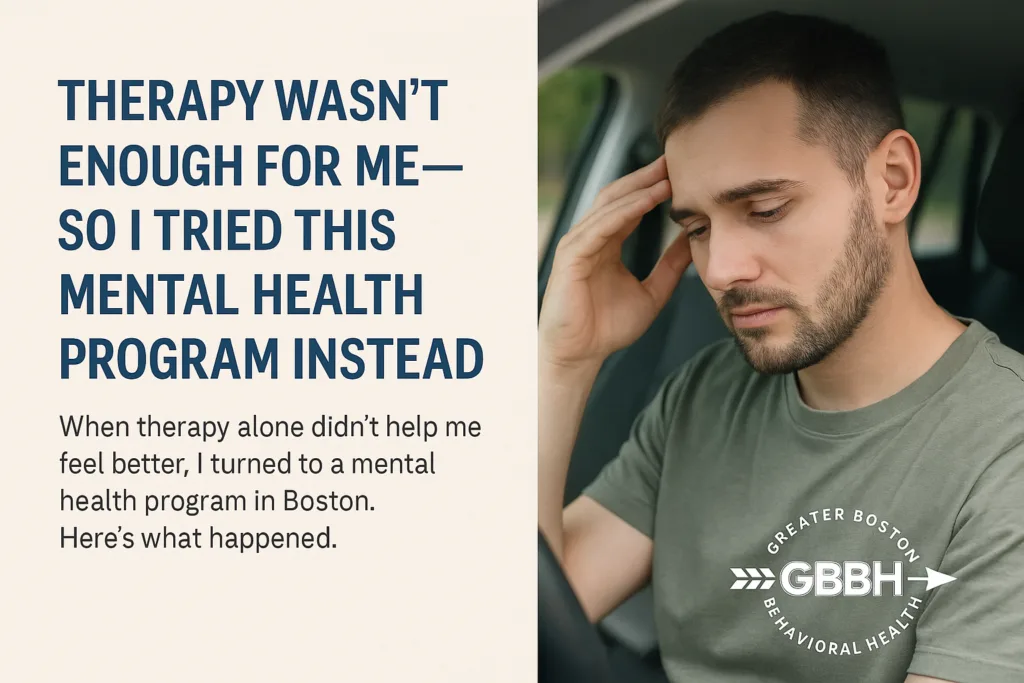I remember the exact moment I realized therapy wasn’t working for me anymore. It wasn’t dramatic. There was no breakdown, no hospital visit. I was sitting in my therapist’s office, nodding along, and I realized I was performing. I was saying all the right things, giving her what I thought she needed to hear. But inside, I felt completely hollow.
I walked to my car, sat in the driver’s seat, and just stared at the steering wheel. I wasn’t in crisis, but I wasn’t okay either. I had done everything I was “supposed” to do: I reached out for help. I showed up. I tried. And yet I still felt like I was quietly falling apart.
When Weekly Therapy Isn’t Enough
If you’re reading this, you might know that feeling too. Maybe therapy helped at first. Or maybe it never really landed. Either way, if you’re stuck in a cycle of barely holding it together, it doesn’t mean you failed. It might just mean you need something different.
For me, it was realizing that one hour a week just wasn’t enough to support the kind of healing I needed. I needed more time. More tools. More accountability. I needed help that showed up more than once a week and didn’t end when the clock hit 50 minutes.
I Thought a Mental Health Program Was “Too Much”
I used to think programs were for people who were really in crisis. Like, hospitalized-level crisis. That wasn’t me. I had a job. I showered. I could fake okay.
But “functioning” isn’t the same as thriving.
What I didn’t realize then was that many mental health programs—like the one I found at Greater Boston Behavioral Health—are designed exactly for people like me. People who aren’t in immediate danger, but are exhausted by their own internal battle. People who need more support, more structure, more connection than weekly therapy can provide.
Finding Greater Boston Behavioral Health
When I first reached out, I was nervous. Would it be too clinical? Too intense? Would they tell me I didn’t belong?
They didn’t.
Instead, they listened. They asked questions I hadn’t even known I needed to answer. They made space for my fears and my numbness. And then they invited me into their mental health program—not as someone broken, but as someone who deserved real help.
The program gave me a rhythm. Group sessions that taught me how to name what I was feeling. Individual support that went deeper than anything I’d had before. Tools I could actually use in the middle of a hard day. And maybe most important—people. People who understood. People who didn’t ask me to be okay. People who didn’t flinch when I said the quiet parts out loud.
What Changed for Me
I won’t lie—it didn’t happen overnight. I didn’t walk into the program and feel instantly healed. But I did feel seen. And that mattered more than I expected.
After a few weeks, I noticed I was breathing more easily. I wasn’t bracing for the next meltdown. I started sleeping better. I started laughing again. I started believing that maybe I could build a life that didn’t revolve around just surviving.
I don’t share this to sell a fairytale. Healing is real, but it’s also messy. What I want you to know is that if therapy isn’t working for you, that doesn’t mean you’re out of options.
You Deserve More Than “Barely Coping”
If your mind immediately tells you, “But I should be able to handle this…”
Please know: needing more help doesn’t make you weak. It makes you human.
Greater Boston Behavioral Health didn’t “fix” me. They gave me space. They gave me skills. They gave me support I didn’t know I was allowed to want.
If you’re in Boston, MA and therapy isn’t enough, consider this your sign: There are mental health programs built for exactly this moment.
Frequently Asked Questions About Mental Health Programs
What is a mental health program?
A mental health program is a structured form of care that offers more intensive support than traditional outpatient therapy. It may include group therapy, individual sessions, medication support, and skill-building activities multiple times a week.
How is it different from regular therapy?
Therapy is typically one-on-one and once a week. A mental health program offers multiple sessions a week and often combines different types of therapy and support to help you make deeper, more sustained progress.
Do I have to be in crisis to join a program?
Not at all. Programs are often designed for people who are struggling but still functioning in daily life. You don’t have to hit rock bottom to get help.
Is it a live-in program?
Not necessarily. Many programs, like Intensive Outpatient Programs (IOPs) or Partial Hospitalization Programs (PHPs), allow you to live at home and attend sessions during the day.
What if I’m not sure it’s right for me?
That’s okay. Most programs, including Greater Boston Behavioral Health, offer assessments or consultations to help determine what level of care makes the most sense for you.
Ready to take the first step?
Call Greater Boston Behavioral Health at (888)301-8072. You don’t have to figure this out alone. We’re here to talk it through, answer your questions, and help you find a path that fits.


